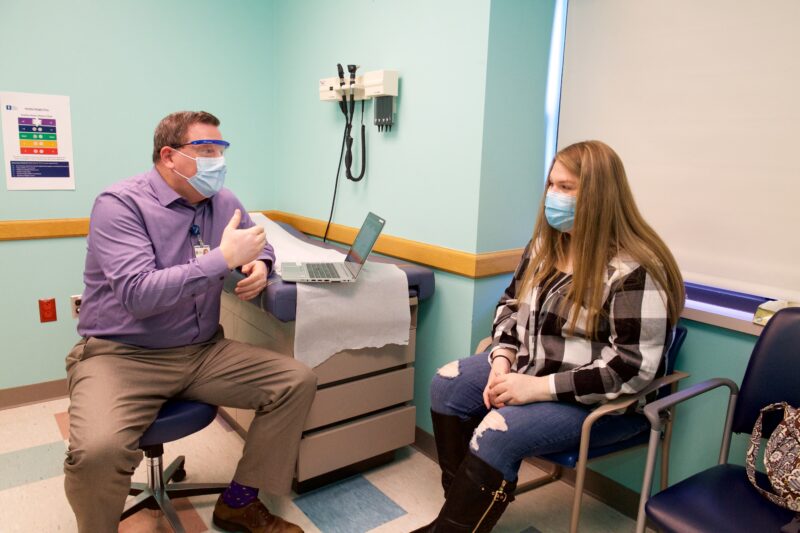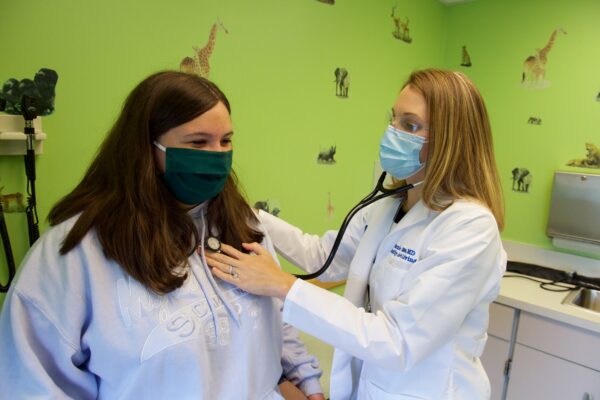
Akron Children’s Pediatric Psychologist Dr. Geoffrey Putt meets with a patient in our Healthy Active Living and Pediatric Bariatric Surgery Program to help treat obesity.
Childhood obesity continues to be a growing problem in this country. According to the Centers for Disease Control and Prevention, the obesity prevalence is nearly 13% among 2 to 5 year olds; 20% among 6 to 11 year olds; and 22% among 12 to 19 year olds.
These kids are at a greater risk for poor health as they grow into adulthood. They have more doctor visits, take more medications and suffer from health problems that were once considered adult issues.
“There’s a misconception that obesity is a result of a character flaw, or personal or parent failure,” said Amy Perusek, APRN-CNP, a pediatric nurse practitioner in Akron Children’s Healthy Active Living and Pediatric Bariatric Surgery Program. “When in fact, obesity is a disease all by itself. One that’s highly associated with fatty liver disease, obstructive sleep apnea, high blood pressure and cholesterol, and type 2 diabetes. These diseases not only add complexity to kids’ lives and decrease their quality of life, but research shows they’re also shortening their lifespans!”
What’s more, kids with obesity are at a higher risk of depression and anxiety, low self-esteem, eating disorders, bullying and behavioral problems.
Akron Children’s Healthy Active Living and Bariatric Surgery Program are making strides to reverse this trend — one child at a time. Amy and the clinic’s multidisciplinary team are helping kids lose significant weight successfully — sometimes through bariatric surgery — and improve their health, both physically and emotionally.
Once referred, kids undergo an evaluation and determine which treatment pathway to follow: intensive lifestyle therapy or bariatric surgery.
“During the initial assessment, I evaluate the child’s medical history, identify barriers to treatment and, together with the family, develop an individualized treatment plan,” said Amy, who is the first provider with whom kids interact. “We communicate empathically that we understand their struggle, and we have options and tools available to help treat the disease and emotional struggle that they’ve carried around for a long time.”

Akron Children’s Dr. Marnie Walston checks a patient’s vitals during an appointment. Healthy Active Living brings together a team of dietitians, exercise specialists, psychologists, pediatricians and nurse practitioners to treat obesity.
Healthy Active Living
Healthy Active Living brings together a multidisciplinary team of dietitians, exercise specialists, psychologists, pediatricians and nurse practitioners specializing in pediatric obesity medicine. Together, they offer personalized intensive lifestyle therapy to kids ages 2 to 19 who are obese (Body Mass Index is at or above the 95th percentile for age and gender) and struggling with serious weight-related concerns.
At every appointment, kids meet with each member of the multidisciplinary team for coaching on healthy behaviors (i.e., healthy eating, regular exercise, proper rest and less screen time) and disease prevention.
“The focus is always on adopting healthier behaviors for the long haul, and not necessarily just to lose weight,” said Amy. “Kids are growing and can’t always control every pound they gain or lose, but they can, with support, learn to modify their behaviors.”
The team helps kids set goals to eat more fruits and vegetables at every meal, for instance, or swap water for soda at dinner, and be more physically active each day. These goals are more easily achieved — and within kids’ control — than a goal to lose 10 pounds.
“During follow-up appointments, we discuss and identify things that went well and help kids and families work through barriers that prevented them from reaching their goals,” explained Amy. “We then set new goals to build upon the successes kids have.”
Bariatric Surgery Program
To help kids find more success with long-term weight loss, bariatric surgery may be an option. Candidates for surgery have a BMI of 40 or greater or a BMI of 35 or greater with weight-related health problems.
Research shows only 2 to 15 percent of teens with severe obesity will achieve long-term weight loss through diet and exercise alone. “Obesity is a complex disease, and bariatric surgery, in conjunction with healthy lifestyle behaviors, can be a very powerful tool for teens to lose significant weight and improve their health,” said Amy.
Before patients are approved for surgery, teens and their family must commit to at least 6 months of intensive lifestyle therapy and undergo medical evaluations. This ensures they are safe for surgery and any medical issues can be treated.
“Our nurse practitioners keep tabs on all the moving parts that go along with this disease,” said Amy. “We co-manage patients’ comorbidities, such as diabetes, sleep apnea and fatty liver disease. We educate families on how these other medical issues are connected to obesity and how getting healthier can help relieve symptoms.”
What defines success?
The goal of these programs is to improve kids’ health and well-being, and success can come in many forms. Initially, success can mean not gaining any more unhealthy weight by improving lifestyle habits and stress management, and getting more physically active. It may even be influenced by weight-loss drugs.
In addition, improving comorbidity markers are key to success. When kids’ weight stabilizes or even begins to drop, they might see improvements in blood sugar, blood pressure and cholesterol. With significant weight loss, patients may reduce and, in some cases, fully reverse complications from chronic disease, like fatty liver disease, sleep apnea and diabetes.
“Research shows a multidisciplinary team is the most effective approach to treating obesity,” said Amy. “Obesity is a complex disease and it’s difficult to tackle all the moving parts. I’m thankful to work with this great team that is improving kids’ health and making a difference in their lives.”
Learn more about Akron Children’s Healthy Active Living and Pediatric Bariatric Surgery programs. Call 330-543-5673 to schedule an appointment.











